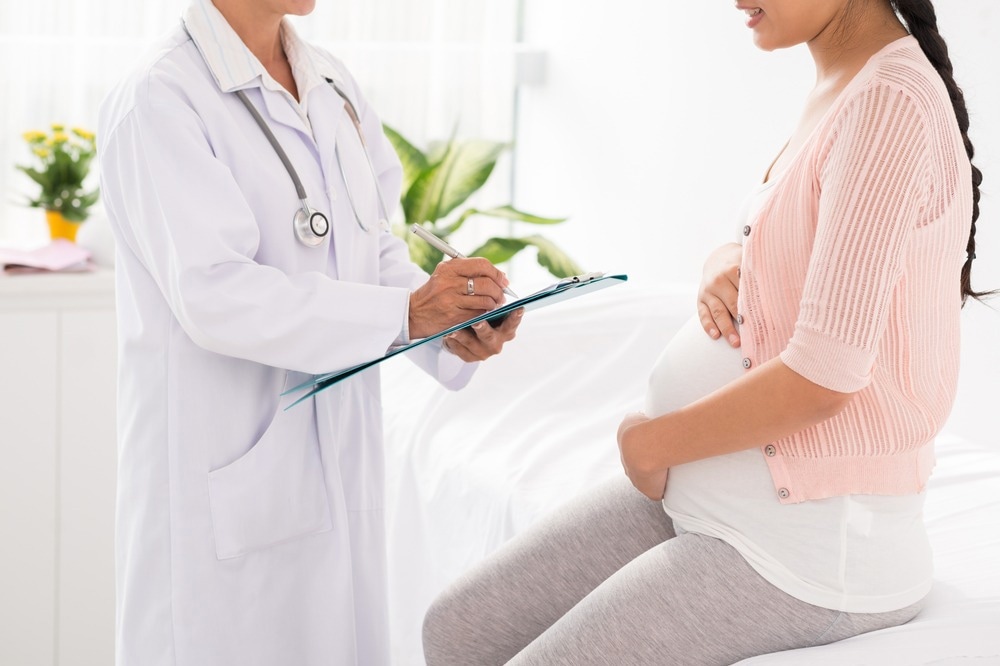Researchers from various institutions throughout the United States describe the results of a sequential and prospective meta-analysis of over 13,000 pregnant women in a recent BMJ Global Health study. Using a harmonized data collection and analytical strategy, the researchers assessed the risk of maternal, fetal, and neonatal morbidity and mortality in women diagnosed with the coronavirus disease 2019 (COVID-19) during pregnancy.
Study: Adverse maternal, fetal, and newborn outcomes among pregnant women with SARS-CoV-2 infection: an individual participant data meta-analysis. Image Credit: Dragon Images / Shutterstock.com
Pregnancy and COVID-19
Pregnancy leads to various physiological, immunomodulatory, and mechanical changes that often increase women’s susceptibility to certain illnesses, such as COVID-19, and their severe effects.
One meta-analysis of 47 studies suggests that this patient population is at a greater risk of mortality, intensive care unit (ICU) admission, preterm birth, stillbirth, and neonatal care unit admission than pregnant women without COVID-19. Another recent report found that women diagnosed with COVID-19 at the time of giving birth were also more likely to require extended hospitalization that involved critical care for both the mother and child.
Despite these observations, researchers cannot synthesize available information on the impact of COVID-19 during pregnancy due to widespread heterogeneity among these studies in outcome definitions, population-specific baseline-risks, and the methods used to diagnose COVID-19. Furthermore, pregnant women in low-income countries have not been extensively studied.
About the study
The current study involved pooling data from independent studies using harmonized data definitions and an individual participant data (IPD) meta-analytical framework. Eligible studies included registries, single and multi-site cohorts, and case-control studies involving pregnant women with suspected or confirmed COVID-19. Notably, a COVID-19 diagnosis was confirmed through polymerase chain reaction (PCR) assay, antigen tests, serology testing following a known exposure, or according to the suspected case definition by the World Health Organization (WHO).
To ensure the integrity of IPD for the study, the researchers identified any potential outliers and inconsistent values for important data points such as gestational age at birth, maternal age, and neonatal birth weight. The four patient outcome categories assessed in the study included maternal mortality and morbidity, fetal and neonatal mortality and morbidity, adverse birth outcomes, and severe COVID-19 outcomes.
Taken together, a total of 12 studies conducted between February 2020 and July 2021 were included in the final analysis. These studies were conducted in 12 countries, including Ghana, China-Hong Kong, Italy, Kenya, Nigeria, South Africa, Spain, Sweden, the Democratic Republic of Congo, Turkey, Uganda, and the United States. As a result, a total of 1,942 pregnant women with COVID-19 and 11,194 pregnant women who were negative for COVID-19 were included.
COVID-19 increases the risk of maternal morbidity and mortality
Compared to pregnant women negative for the severe acute respiratory syndrome coronavirus 2 (SARS-CoV-2), a diagnosis of COVID-19 at any point during pregnancy increased the woman’s risk for all critical COVID-19 indicators. These severe COVID-19 effects included ICU admission, any ventilation use, and clinician-diagnosed pneumonia.
More specifically, COVID-19 increased a pregnant woman’s absolute risk of ICU admission and critical care requirements by 3% and 4%, respectively. Pregnant women diagnosed with COVID-19 were five times more likely to require critical care as compared to SARS-CoV-2-negative pregnant women.
Notably, these adverse effects were more common among pregnant women with symptomatic COVID-19. In addition, the risk of maternal death was also significantly higher among pregnant women with symptomatic infection than uninfected women.
Of the three included studies that reported deaths during the study period, COVID-19 increased the risk of maternal death. A greater risk of pre-eclampsia, thromboembolic disease, and hypertensive disorders of pregnancy was also observed among pregnant women with COVID-19.
The risk of cesarean section was slightly higher among pregnant women diagnosed with COVID-19. Notably, no significant difference in the risk of preterm labor, hemorrhage, placental abruption, eclampsia, or intrapartum cesarean delivery was identified.
Adverse neonatal outcomes and maternal COVID-19
An increased risk of neonatal ICU (NICU) admission was reported among infants born to mothers diagnosed with COVID-19. These findings are consistent with other studies, such as the INTERCOVID study, which reported a similarly greater risk of preterm birth in SARS-CoV-2-infected women.
Furthermore, infants born to infected mothers were more likely to be born preterm and moderate preterm, as well as have a low birth weight.
Conclusions
Although a diagnosis of COVID-19 significantly increased the risk of numerous maternal morbidity and mortality markers, as well as various neonatal outcomes, symptomatic infections were an even greater risk factor for these adverse effects.
Taken together, these findings emphasize the importance of continued vigilance among pregnant women to prevent SARS-CoV-2 infection through vaccination and the use of non-pharmaceutical interventions like masks and social distancing.
